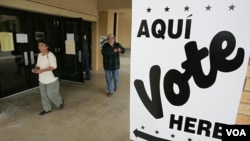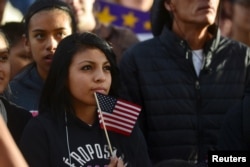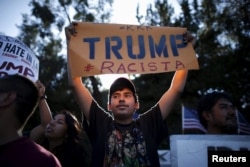For lots of people, choosing a presidential candidate can be difficult. But for Guillermo Laurent, the decision is practically impossible.
"There's really no choice for me," says Laurent, the pastor of a Spanish-speaking Baptist church in Spartanburg, South Carolina.
Laurent is one of a rapidly growing number of Hispanic evangelicals in the U.S. — a group that feels torn between Republicans and Democrats.
Supporting a Democrat would go against Laurent's conservative religious views on abortion, gay marriage and other social issues.
But choosing a Republican would mean supporting what he says are "anti-immigrant" positions, and ones that would likely result in many of his friends being deported.
It's a catch-22, and not unlike the same dilemma faced by many Hispanic Catholics, who make up about half of all Latinos in the U.S.
Evangelicals more conservative
But while both groups have conservative views on social issues, evangelical Latinos skew even further to the right, according to Pew Research Center.
A 2014 Pew study found 70 percent of evangelical Latinos think abortion should be mostly or entirely illegal. That is compared to roughly half for Catholics.
On homosexuality, the difference was even more stark, with 66 percent of evangelicals opposing gay marriage, compared to just 30 percent for Catholics.
Those more conservative social views affect party affiliation, too. While both religious groups lean toward the Democratic Party, evangelicals are 10 percent more likely to identify as Republicans, according to Pew.
Swing vote
"We're the quintessential swing voters," says Gabriel Salguero, president of the National Latino Evangelical Coalition. "We're evangelicals, so people assume we're conservative. But because we're Latino, people assume we're progressives."
In reality, Hispanic evangelicals can vote either way, says Salguero, noting that both Barack Obama and George W. Bush won the Latino evangelical vote in recent elections. "If any Latino religious group is persuadable, it's the evangelicals," he says.
But in recent months, Republicans have made little effort to attract Hispanics, instead engaging in fierce immigration rhetoric that many Latinos find deeply offensive.
Leading the way has been Donald Trump, who has referred to Mexican immigrants as rapists, criminals and drug dealers.
There have also been calls to build a massive wall between the U.S. and Mexico, and threats to round up and deport every one of the country's millions of illegal immigrants.
It wasn't supposed to be this way. After the 2008 and 2012 presidential elections that saw Republicans lose the minority vote by a wide margin, party leaders urged candidates to take more inclusive immigration views.
That effort has failed, in large part because of the success of Trump in early primary states.
By failing to rein in such rhetoric, Salguero says Republicans are driving away a key bloc of voters that could be a natural ally come November's general election.
"I think Republicans are making a great mistake in that regard," he says. "And I think that's going to have serious and deleterious electoral ramifications."
More tough talk
As the primary election now moves toward southern states with larger percentages of Hispanic voters, the Republicans' tough talk on immigrants shows no signs of letting up.
At Thursday's presidential debate in Texas, Senators Marco Rubio and Ted Cruz — both Americans of Cuban descent — dismissed concerns over the party's harsh immigration rhetoric.
"A lot of folks in the media have a definition that you can only be Hispanic if you're liberal," Cruz said. Many Hispanics, he insisted, value "faith, family and patriotism."
Rubio, who has taken a slightly more moderate tone, acknowledged immigration is "important" for Latinos, but added: "We have to move past this idea that somehow the Hispanic community only cares about immigration."
According to Rubio, the most powerful sentiment for Hispanics is economic: "the burning desire to leave your children better off than yourself."
But for Hispanics like Laurent, that means having to choose between religious values and core concerns over the well-being of his community.
In the end, he says many Hispanic evangelicals in his congregation will likely vote for Democrats, with concerns over personal safety outweighing religious convictions.
"We are scared. Really. We feel fear," Laurent says. "The Hispanic community feels fear. Because many people in America listen to what Mr. Trump says."






